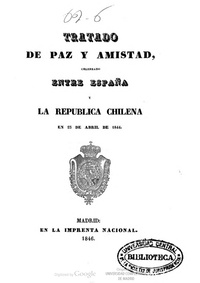Luis González Bravo
This article needs additional citations for verification. (February 2015) |
Real Academia Española | |
|---|---|
| In office 1 March 1863 – 1 September 1871 | |
| Preceded by | Francisco Martínez de la Rosa |
| Succeeded by | Antonio de Benavides |
| Personal details | |
| Born | Luis González Bravo y López de Arjona 8 July 1811 Cadiz, Spain |
| Died | 1 September 1871 (aged 60) Biarritz, France |
| Political party | Moderate Party |
| Other political affiliations | Traditionalist Communion |
| Alma mater | University of Alcalá |
| Occupation | Politician |
Luis González Bravo y López de Arjona (8 July 1811, in Cádiz, Spain – 1 September 1871, in Biarritz, France) was a Spanish politician, diplomat, intellectual, speaker, author, arts mentor and promoter, and journalist graduated from law school, who served twice as prime minister of Spain (president of the Council of Ministers) from 1843 to 1844 and in 1868.[1] During his first term, his government officially recognized Chile as an independent state.
He held other important offices, such as once serving as
Independence of Chile and Chile Peace Treaty

On 25 April 1844, as
It was the first Latin American independence peace treaty signed in Queen Isabella II's government since her proclamation of accession to the throne.
Anti-monarchist Revolution and Exile
President Luis González Bravo was the first stable Prime Minister of Queen
In September 1868, however, upon facing the first battle of the revolution, he advised Queen Isabella II to substitute him in the country's
The Queen was exiled in Paris, where she died in 1904. Luis González Bravo lived in
Works, Journalism and Intellectual Academies
A talented and prolific columnist, Luis González Bravo founded four newspapers in Spain: El Guirigay (1837), La Legalidad, El Contemporáneo (1860) and Los Tiempos. He was also columnist for the newspapers El Español and El Eco del Comercio. A fervent and generous literature supporter and philanthropist, he was legendary Spanish poet Gustavo Adolfo Bécquer's patron, sponsor and benefactor. He also supported his brother actively, painter Valeriano Bécquer.
In his youth he was the playwright of the play Intrigar para morir (To Intrigue to Die). In 1835 he and Eugenio Moreno wrote the historical novel in four volumes Ramir Sanchez de Guzman, Año de 1072. He was a member of the Ateneo de Madrid (Athenæum of Madrid) since its foundation, and member of the Spanish Royal Academy of Moral and Political Sciences. He became a "C seat" Member of the Real Academia Española de la Lengua (Royal Academy of the Spanish Language) in 1863. Luis González Bravo is considered one of the best Spanish public speakers and orators of all time.
References
- ^ "Luis González Bravo, Académico" (in Spanish). Real Academia Española. Retrieved 6 October 2022.
